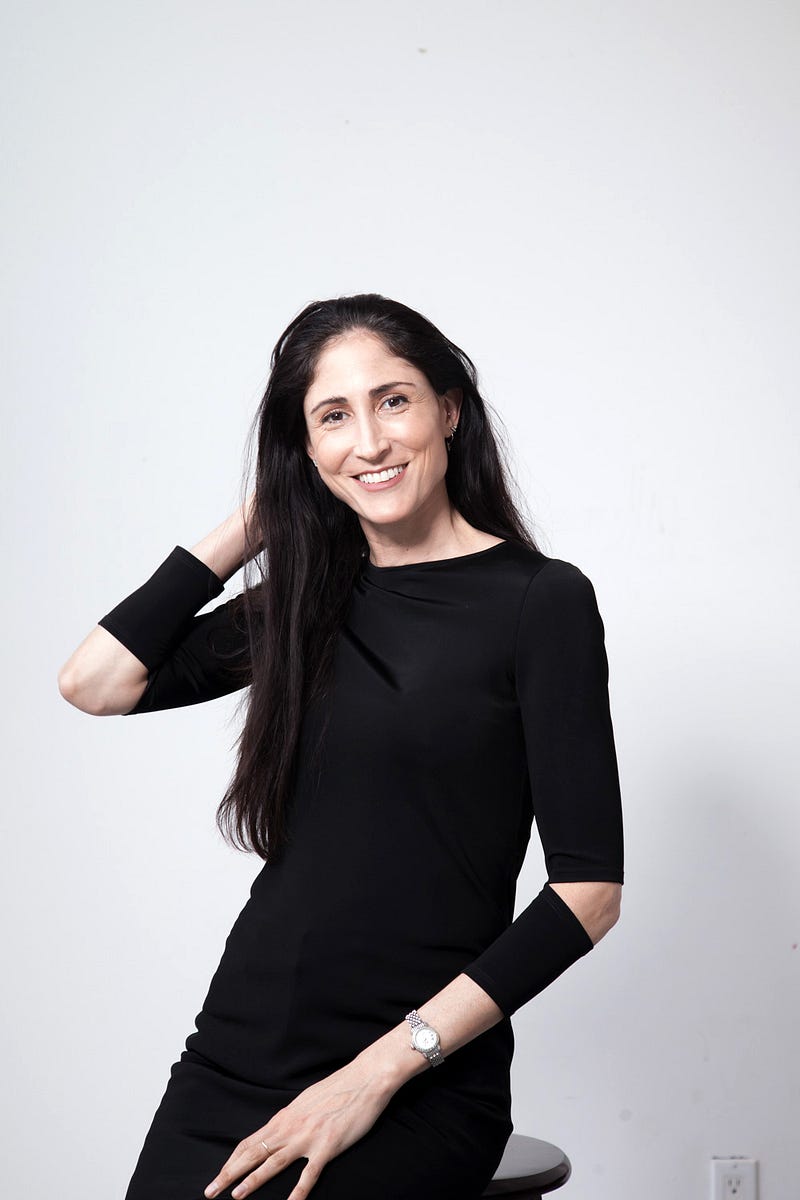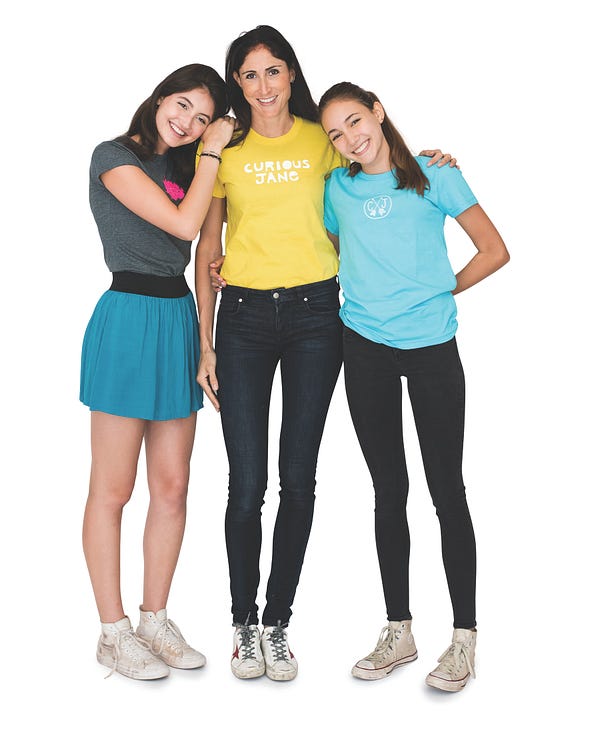
Anger is a tricky little elf. It makes you think you need it. It sets up an “I’m right, you’re wrong.”
As part of my series about the “5 Things You Need To Know To Survive And Thrive After A Divorce” I had the pleasure of interviewing Samantha Razook.
Samantha Razook is the founder and CEO of Curious Jane, an educational content company for girls ages 6 to 11 with projects and curriculum around science, engineering and design.
Samantha started Curious Jane ten years ago as a summer camp for girls to be creative and inventive in a high-energy space. In 2014, Curious Jane was the recipient of the Chase’s Mission Small Business Grant — an unrestricted $250k awarded to 12 businesses from an applicant pool of over 35,000. Today, Curious Jane runs camps, classes, and workshops year-round; prints project books and a maker magazine for girls; and collaborates with like-minded organizations to share content with girls nationwide. Curious Jane has partnered with The
Confidence Code for Girls, Amy Poehler’s Smart Girls and LiveGirl, Inc.
Samantha earned her BA from Yale in Graphic Design and her Masters from Pratt in Industrial Design. She grew up in Atlanta, GA and landed in Gowanus, Brooklyn, a thriving neighborhood of creative small businesses and industries.
Thank you so much for doing this with us! Can you tell us a story about what brought you to this specific career path?
I do not work professionally in any area related to divorce, however, I navigated this difficult territory while raising young children and running a business. My husband and I chose to manage the dissolution of our marriage and the restructuring of our family through collaborative divorce. This does not mean it was easy or amicable. Divorce is painful, difficult and often divisive. At the same time, it is one of the most intimate things you can go through with your partner. We have two children, we each run a business, we co-parent in unity, and we value each other.
Though there were moments it teetered on a precipice of acrimony that would tip us into a multiple-lawyer pathway, we felt strongly about defining our own way — the two of us together, for and around our family — and did not want to increase a pitted battle against each other with a lawyer on each side.
Collaborative divorce for us meant a process in which my husband and I made the decisions around how we would untangle our personal, financial and professional lives — as they pertained to our marriage — and have these decisions formalized and represented in a legal document by a single lawyer who did not represent one or the other of us, but who represented what *we* wished to accomplish. It gave us a great deal of autonomy and responsibility over the process.
Divorce, the most humbling and private of experiences, has a very public face as well. People do not know how to act around you or see it as an opportunity to share their own grievances about your partner, or they feel they need to support your anger in order to ease your pain. I felt very strongly about controlling public perception as a mode of protection, and it was important to both of us.
Our divorce, as all are, was a difficult process, and we had additional challenges thrown our way while we were going through it. However, our family ultimately came out well and strong.
Can you explain to our readers why you are an authority about “divorce”?
While I do not have a professional background in divorce, my personal experience is unique as my ex-husband and I designed our own divorce. We primarily did this over a series of lunch meetings at a restaurant between our offices. The setting kept our manners in check, the hour-long time block kept the conversation contained and the mid-day meeting ensured we were both at an energy level where we could give attention and thought to what we needed to discuss.
Since my own divorce, many people have approached me for my thoughts on various points of their own divorces. As a result, divorce — especially collaborative, or self-guided divorce — is something that I’ve given a lot of thought to and feel strongly about. It’s a topic that I’m now privy to and which I’m thankful to be able to discuss with others who are going through the process.
Can you share a story about the funniest mistake you made when you were first starting? Can you tell us what lesson you learned from that?
I can’t remember points during our divorce that were funny, but I can certainly remember points that were poignant. I can also remember plenty of times that my ex-husband and I have been able to laugh together, not about the divorce, but *since* the divorce. And when we do accomplish something well, we make sure to call attention to it, and to each other, as it gives us a greater platform of confidence in continuing our relationship going forward. That we have the opportunity to love and respect each other, in a devotion outside of marriage, is an honor, and something that we’ve worked hard for. When we backslide, we make sure to acknowledge it as well. Then we can re-focus, and find a point of connection, understanding, or even humor, and try to improve.
If you had a close friend come to you for advice after a divorce, what are 5 things you would advise in order to survive and thrive after the divorce? Can you please give a story or example for each?
The key that over-arches all others? Let go of anger. This is something that our couples’ therapist advised me, straight to my face, in front of my husband, and it was the most important thing anyone told me.
There were many reasons why an outsider might see me as “right” in asking for the divorce, and when our therapist told me I would need to let go of anger, I thought “I’m not angry, I’m right.” But there it was, anger, plenty of it, like an immense tumor in my gut.
Letting go of anger is not easy. Anger, almost always, covers other emotions that are more painful to address — like disappointment, vulnerability, your own wrong-doing, and deep hurt — but identifying these is most important and productive. Letting go of anger takes a lot of attention and practice, like breaking any strong habit, but it does get easier over time. And the person that it benefited the most, by far, was myself.
Some additional words of wisdom for someone going through a divorce:
- Expect it to be a 3-year recovery — financially, emotionally, and in family structure — the first is the most fiery, like a comet, then it tails off. You will get through it.
- Gather your lifeboat — find resources and support in unlikely places. You will find that various people in different parts of your life will surface as essential relationships of relief, distraction, and advice.
- Watch your words — protect yourself and your family from gossip and “side-taking”. Divorces can be polarizing and others will have strong opinions about it. Protect yourself by staunching negative talk. Confide in close friends, but don’t accept hurtful talk and rumors, not from others or yourself.
- Separate the tasks — you don’t have to figure it all out at once. Start with one piece (children, home, finances) and move to the next. When I realized that my husband felt that I would use custody of our girls as a bargaining chip for other negotiations in the divorce, we decided to settle and sign-off on that point first. We resolved the custody (complete, joint) and then moved
to the other pieces. Once the threat was reduced, we made better, more thoughtful decisions. - As advice 5b here, I’d like to add — mothers and fathers, don’t try to take your children away from their other parent for reasons of hurt or anger.

What are the most common mistakes people make after they go through a divorce? What can be done to avoid that?
The five things that I would say to advise a friend are all suggestions that came out challenges or mistakes I experienced, and that I see others experience as well. These include trying to do everything at once, using anger as rocket fuel to propel you forcefully out of a hard situation, and allowing others around you to “support” you with strong side-taking and highly negative talk.
What can be done to avoid mistakes? You’re never going to avoid all of them, so tap into an area of self-compassion and forgive yourself for missteps. Use them as an opportunity to re-focus on the path or conviction that you would rather follow. Take a pause — it’s totally okay to ask for one — and re-group. Also, find someone who can really support you in your goals and who will help keep you accountable to how you want to conduct your divorce. They will be able to offer compassion and advice, even when you feel tapped.
Do you have any favorite books, podcasts, or resources related to this topic that you would recommend to our readers?
I’d recommend NPR’s This American Life podcast called “Break Up” as well as collaborative divorce resources, including therapists and lawyers trained in the process, as well as books.
Can you please give us your favorite “Life Lesson Quote” that helped you in this work? Can you share
how that was relevant in your real life?
Anger is a tricky little elf. It makes you think you need it. It sets up an “I’m right, you’re wrong.” It’s very self-righteous. We have a short stint on this earth, and anger is the heaviest weight.
Are you working on any exciting new projects now? How do you think that will help people?
We are always working on new projects at Curious Jane, and I hope that everything we do helps people! To serve groups outside of Curious Jane, we are adding a training layer to our curriculum so that activity leaders in under-served communities can bring content and projects to their students. Within Curious Jane, we work with over a hundred young women and give them positions of responsibility and leadership — we take this role very seriously and are constantly fine-tuning the systems and support we offer. And, of course, we are always pushing to expand, in order to reach more girls in more places, and foster confidence-building through making things!
Because of the position that you are in, you are a person of great influence. If you could inspire a movement that would bring the most amount of good to the most amount of people, what would that be? You never know what your idea can trigger. 🙂
I’d like to really encourage separating or divorcing couples to seek collaborative divorce as an option that might work for them and their families.
Some of the biggest names in Business, VC funding, Sports, and Entertainment read this column. Is there a person in the world, or in the US with whom you would love to have a private breakfast or lunch with, and why? He or she might just see this if we tag them 🙂
Rather than a well-known person, I’d like to spend time with the unnamed heroes — those offering micro-loans for female-run initiatives and starting grassroots initiatives to help underserved women and girls. Those are the people who most inspire me.


